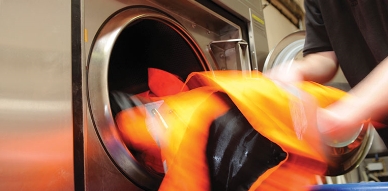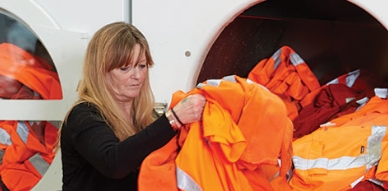How to Reduce the Workwear COVID-19 Risk
When it comes to hand washing, face covering and social distancing, we all know the precautions we should be taking as we fight our way through the Coronavirus pandemic. We’ve also been urged to ‘Stay Home’ and ‘Stay Alert’. But if you are responsible for uniformed workers, how can you reduce the risk of transmitting COVID-19 through workwear?
According to medical research, it’s assumed that fabric behaves in the same way as cardboard, on which COVID-19 particles can remain active for up to 24 hours, with harder materials supporting Coronavirus for up to 72 hours.
Whether your team is responsible for washing their own uniform or your organisation makes use of a commercial laundering service, such as that offered by phs Besafe, the same precautions should apply in order to help protect your staff, their friends and family, and anyone who visits your premises:

Separate It - As soon as workwear is removed, it should be kept separate from other clothing, either at home in a separate laundry basket or in the workplace, in a garment collector. Placing the workwear immediately into a washable bag means that it can go straight into the washing machine, without risk of exposing any virus to handlers.
Don’t Shake It - Handle soiled workwear very carefully, while wearing a face mask, to prevent any Coronavirus particles being wafted into the air and infecting bystanders.
Heat It - Viruses thrive in low temperatures – this is why the common cold always takes hold in the winter. So, when it comes to ridding workwear of COVID-19 particles, it should be washed at the highest temperature appropriate for the garment, in many cases, this is 60 degrees.
Wash It - We’re not just talking about the workwear. If anyone must handle your uniforms, either clean or soiled, they should wear disposable gloves, and afterwards, wash their hands thoroughly.
Bag It - Once clothing is clean, it should be placed into a bag and sealed, without delay. This will prevent the clothing from becoming contaminated with Coronavirus before it is worn again.
Think About It - If your employees have been in situations where they are likely to have come into contact with COVID-19, they’ll have to launder their workwear more often. As a responsible employer, you should direct them to wash their kit more frequently or increase the frequency of your laundry service collections.
Why Not Let phs Besafe Do It? - All of this is a heavy burden for workers to bear. If you’re concerned about proper laundry practice, it might be easier to use phs Besafe to safely wash and return your employees’ uniforms. We’ll collect workwear from your site whilst taking appropriate precautions regarding PPE and social distancing.

On arrival at one of our 5 strategically located laundries, the phs Besafe team will work together effectively to make sure that workwear is laundered in the correct manner. Then we’ll return workwear to you, clean and safely packaged. All we ask is that you mark any suspected COVID-19 infected workwear and place it in one of our soluble bags so that it can go directly into our washing machines.
The majority of phs staff have been designated as critical workers, which means that we can continue to provide these essential services throughout the pandemic alongside many of our customers. Should you need to add a laundering service to your operations or want to amend your existing plan, please contact our customer services team. We’re here to help you and your business work together to defeat this pandemic.